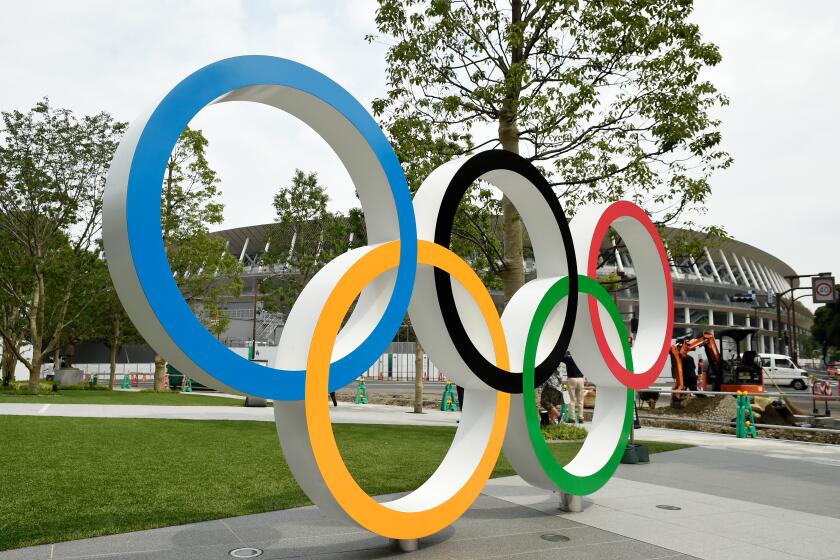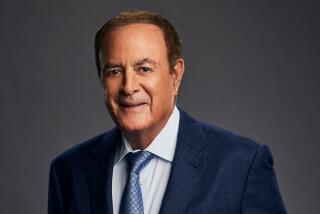Listen to Al Michaels reflect on shocking, but not surprising, Olympics postponement

- Share via
It was month ago that we celebrated the 40th anniversary of the “Miracle on Ice,” when the U.S. men’s hockey team pulled off its highly improbable 4-3 victory over the Soviet Union. That’s when young announcer Al Michaels made his iconic call — “Do you believe in miracles? Yes!” — in the waning moments.
Now, along with everyone impacted by the coronavirus outbreak, Michaels is in disbelief.
He wasn’t shocked, however, that this year’s Summer Games were postponed until 2021.
“The way this thing was enveloping the world it became very clear to me that, how would you in four months bring the world to one particular place? I felt that was going to be impossible,” Michaels said Tuesday from his Los Angeles home. “And secondarily, how were these athletes who are in countries right now that are either quarantined or sheltering in place to varying degrees, how are they supposed to train? So I could see this coming and it’s no surprise.”
Michaels has covered nine Summer Olympics, his first being the 1984 Summer Games in Los Angeles, when he covered track and field at the Coliseum.
Full coverage of the International Olympic Committee’s decision to postpone the 2020 Tokyo Games until 2021 because of the coronavirus outbreak.
He said L.A. “became almost utopia,” with far less traffic and smog than people had anticipated, and “this wonderful feeling that permeated the city.”
“That’s what the Olympics were all about,” he said. “When the world comes together it’s a good thing. People say, ‘Well, it’s politicized. ...’ I know all of the negatives and all of the warts. But it’s kind of cool that all of these peoples from all these different lands can come together at least for two weeks.”
While acknowledging the power of sports to bring people together, Michaels, NBC’s play-by-play announcer for “Sunday Night Football,” questioned the optics of the NFL taking a business-as-usual approach to free agency amid all this uncertainty.
“It’s a distraction to some people, and that’s fine,” he said. “If you’re distracted by free agency and you’re distracted by players signing eight- and nine-figure multigazillion-dollar contracts, that’s fine. I’m not going to judge what somebody else’s distraction is …
“[But] we have a world crisis, and it’s unparalleled. I don’t think we’ve ever had — not in my lifetime — anything like this. And we don’t know what the end game is. … The psychic toll that this is taking right now is huge, it is wide-ranging. We don’t know what the end game is.
The coronavirus crisis has postponed the 2020 Olympic Games, a key TV event for NBCUniversal, which has sold $1.25 billion in ads for the event.
“I look at this whole situation and I think to myself, we’re talking about flattening the curve, which is great, and hopefully we can do that sooner than later and cut down on the number of cases and flatten that curve. But the distance between flattening the curve and sounding the all-clear signal is I don’t know how long.”
He said he can imagine sporting events taking place without crowds in the coming months, but that he has a hard time envisioning people sitting shoulder-to-shoulder anytime soon.
“I don’t want to sound like I’m overly pessimistic right now. But maybe our temporary national anthem should for at least a while be taken from the musical ‘Annie’ where the sun will come up tomorrow. Hopefully, it will. Because right now we’re in a dire place, we’ve never been here before, and we have to come out of it at some point. Hopefully it will be sooner rather than later. But in the meantime, sports just has to clearly be on the back burner.”
Although the sports world paused in the aftermath of the terror attacks of Sept. 11, 2001, Michaels said, there was a distinctly different feel at that time.
“I think we took great solace especially after something like 9/11 in people coming together,” he said. “Families physically hugging, and everybody had that feeling of, `Hey, we’ve got to pull together.’ Now, we have to go through this apart. Social distancing? Whoever heard this until now? So this is where we are right now, and who knows what’s around the corner.”
More to Read
Go beyond the scoreboard
Get the latest on L.A.'s teams in the daily Sports Report newsletter.
You may occasionally receive promotional content from the Los Angeles Times.








